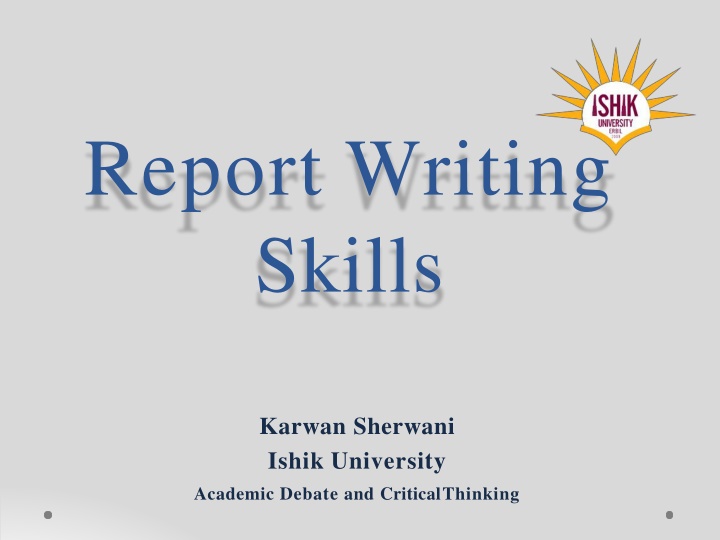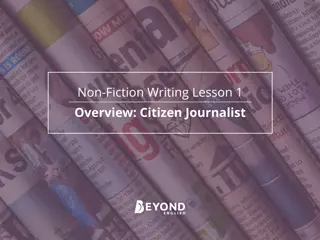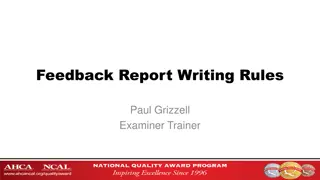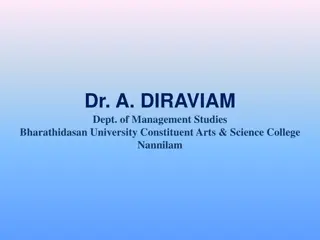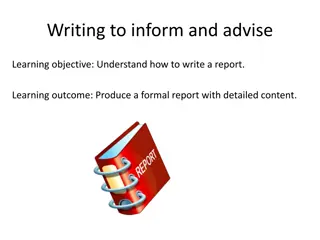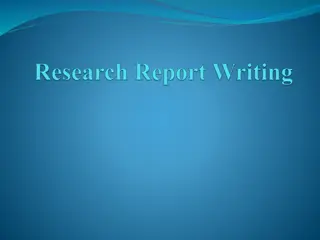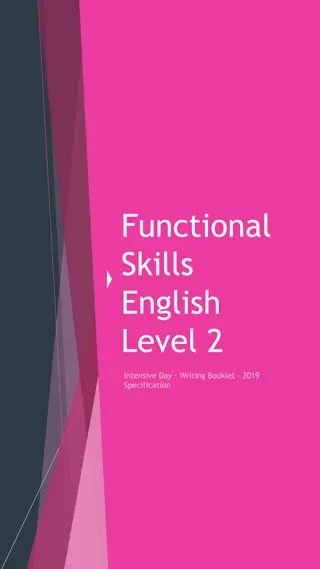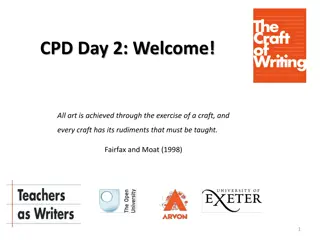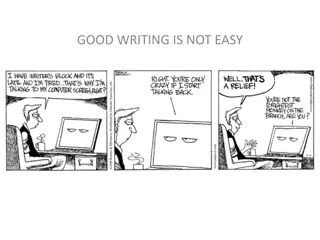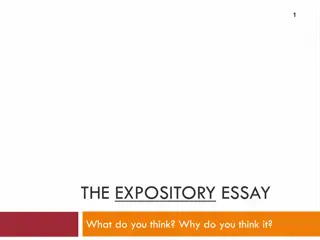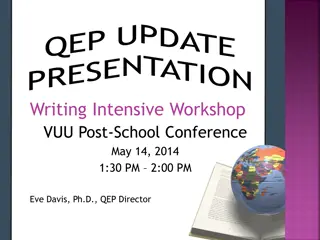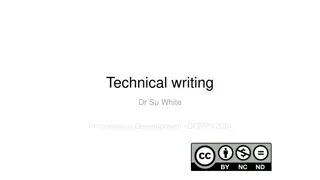Effective Report Writing Skills
Develop your report writing skills with this comprehensive guide that covers the meaning of reports, different types, structures, main parts, and writing strategies. Enhance your ability to present information accurately, reference sources, and plan reports effectively. Master the art of crafting good reports that convey information clearly and concisely.
Download Presentation

Please find below an Image/Link to download the presentation.
The content on the website is provided AS IS for your information and personal use only. It may not be sold, licensed, or shared on other websites without obtaining consent from the author.If you encounter any issues during the download, it is possible that the publisher has removed the file from their server.
You are allowed to download the files provided on this website for personal or commercial use, subject to the condition that they are used lawfully. All files are the property of their respective owners.
The content on the website is provided AS IS for your information and personal use only. It may not be sold, licensed, or shared on other websites without obtaining consent from the author.
E N D
Presentation Transcript
Report Writing Skills Karwan Sherwani Ishik University Academic Debate and CriticalThinking
Content Objectives Meaning of report Why reporting? Types of reports Structure of report Main parts of areport Good vs bad reports Planning a report Tips for referencing andcitation Writing strategies
Objectives To learn techniques of writing a report To investigate and search for information effectively To present information accurately and appropriately To master the topics required for debating
Report An account given of a particular matter, especially in the form of an official document, after thorough investigation or consideration by an appointed person or body. English Oxford Dictionaries A written piece of information about a subject.
Why reporting? To provide and share useful trusted information To keep a record of events/ decisions/ findings/ analyses
Types of Reports Research report Lab report Book report News report Business report Meeting minutes Proposal reports
Structure of Report Title page Summary (Abstract) Table of contents Introduction Body (main sections/ discussion/ results/methods) Conclusion References Appendices
Main parts of aReport Introduction: a introduces the topic of the report and gives a statement that tells the main idea of the report, called a thesis statement. paragraph that starts the report. It The introduction should be interesting to grab thereader s attention.
Main parts of aReport Body: this is the middle part of the report which comprises the main information, data, discussions, analyses, methods, examples and findings. It includes sections and sub- sections.
Main parts of aReport Conclusion: the paragraph that wraps everything up. It gives the summary of the most important points. A strong conclusion makes the readers feel satisfied that the writer presented a complete and effective report. No new information or materials should be presented here.
Main parts inbrief Introduction What will this report be about? What is my purpose for writing it? What will I be answering, explaining or proving? Body What facts and details do I need to share? How can I prove that my ideas are correct? What are my results? Conclusion What was my main idea or statement? Did I answer the question, explain the subject, or prove the argument? Is there a point I want people to remember?
Good vs BadReports Good Bad Concise and accurate information Relevant data anddetails Well-structured (allparts included) Clear aims andpurposes Correct wordings and formatting Too much information Not enough information Irrelevant data anddetails No structure No introduction No conclusion No aim orpurpose Language issues Formatting issues Wrong information
Planning a Report Selecting a Topic Making a list of usefulkeywords Searching for sources andsaving them Reading them Reading more and more Developing an outline Formulate a thesisstatement Writing first draft, second draft, third, forth, final draft Proofreading
Topics 1. Should social networking sites be banned in offices & colleges? 2. Are Degrees necessary for beingsuccessful? 3. Social Networking Sites Killing Email - True orFalse? 4. Are newspapers dying? 5. Higher Education here orabroad? 6. Do marks define the capability of a student? 7. Is English necessary to getdeveloped? 8. Do women make better teachers than men? 9. Does Facebook consume a lot of your productive time? 10. Can a business grow big without being corrupt? 11. Effects of technology on communication in modern society.
Topics 12. How has using technology and social media as tools impacted your education? 13. How mistakes can sometimes turn into opportunities? 14. The Power of family and all that they have to offer. 15. Should schools have a mandatory life skills class? 16. Face to face learning is superior to online learning. 17. There is not enough innovation in education. 18. Should schools be more technologically advanced? 19. Education in prisons should be increased. 20. Everyone should do a special Summer School course every year. 21. How school does not prepare you for the real world.
Tips for Referencing and Citation (Documentation) (Plagiarism) Give a reference to citedmaterials Citing without references APA, MLA, Harvard, Chicago style, Oxford, etc. (Styles) http://pitt.libguides.com/citationhelp/ieee
Example: Inside text: (Greenhall, 2010:15) Greenhall (2010: 15) stated that . According to Greenhall (2010: 15), In the list of references: Greenhall, M. (2010). Report Writing Skills Training Course. Lancashire: Universe of Learning Ltd.
Writing strategies toavoid plagiarism Quotations: texts taken word for word from a source enclosed between quotation marks Paraphrasing: presenting a text in your own words. The paraphrased text is usually shorter than the original source. Summarizing: presenting the main point(s) of a text in your own words. The summary of a text is very short and gives the broad meaning only. In all the original author(s) must be provided.
More tips Brainstorm the topic Take notes Write meaningful complete sentences Avoid very long sentences Present one theme perparagraph Use simple language and avoid jargons Read
Guidelines for assignment 3-5 page paper 4-7 sources (books, articles orwebsites) 700-1000 words Format: visit lecture notes
References Greenhall, M. (2010). Report Writing SkillsTraining Course. Lancashire: Universe of Learning Ltd. Harris, R. A. (2017). Using Sources Effectively: Strengthening Your Writing and Avoiding Plagiarism.5th edn. New York: Taylor &Francis. Roy, J. R. (2012). Sharpen Your Report Writing Skills. NJ: Enslow Publishers Inc. Silyn-Roberts, H. (2000). Writing for Science and Engineering: Papers Presentations and Reports. Oxford: Butterworth-Heinmann.
